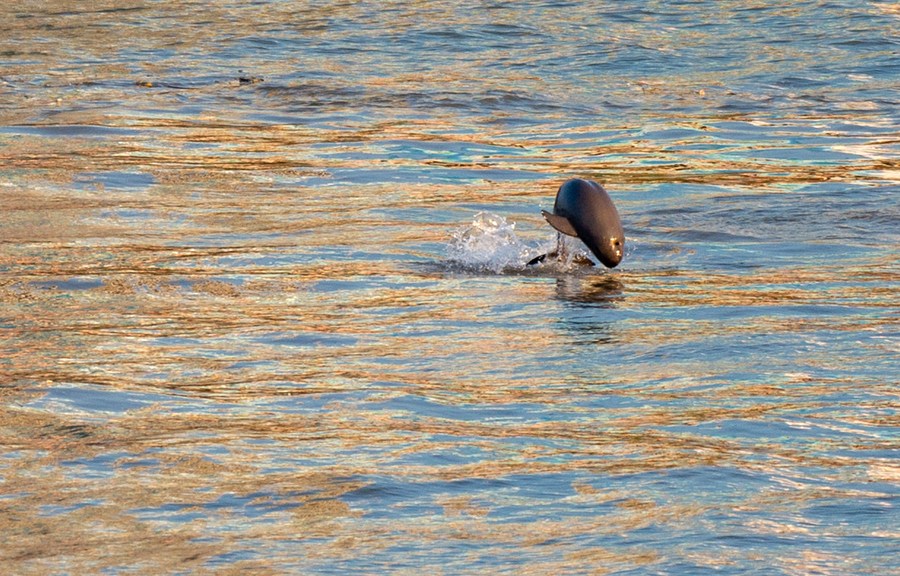Ten-year fishing ban in Yangtze River sees phased progress
A 10-year fishing ban in all key waters of China's Yangtze River basin, starting Jan. 1, 2021, has seen phased achievements, with aquatic creatures gradually recovering and fishermen embracing a new life.

Law enforcement ships are seen at a dock in southwest China's Chongqing on Dec. 31, 2020. (Xinhua/Tang Yi)
Over the past two-plus years, authorities in areas along the Yangtze River have strengthened their law enforcement efforts to ensure the implementation of the full fishing ban. In 2022, agriculture and rural affairs authorities of these areas sent an average of 144,000 law enforcement personnel and 11,000 ships a month, and investigated 18,525 cases, including those of illegal fishing, along the Yangtze River.
Local fishery departments release fish into the waters of the Yangtze River basin and other regions on the national fish releasing day, which falls on June 6 every year.
"As an important measure to protect aquatic bio-resources, fish releasing is of great significance to recovering fishery resources, improving water ecology, increasing fishery benefits, and boosting fishermen's incomes," said Liu Xinzhong, director of the Bureau of Fisheries of the Ministry of Agriculture and Rural Affairs (MARA).
Thanks to the fishing ban, the number of rare Yangtze finless porpoises reached 1,249 in 2022, which marks a significant rebound from 2017, when the figure stood at only 1,012.

A finless porpoise is seen in the Yangtze River in Yichang, central China's Hubei Province, Aug. 3, 2020. (Photo by Lei Yong/Xinhua)
Rare and endangered fish species, including Chinese sucker fish, Chinese longsnouted catfish, and barcheek goby, have been frequently spotted in the Yangtze River.
The recovery of the four major Chinese carps, namely black carp, grass carp, silver carp and bighead carp, as well as iconic species in areas along the Yangtze River, is accelerating.
An investigation by the MARA showed that 193 species of fish were monitored in key waters of the Yangtze River basin in 2022, up from 168 in 2020.
"The ultimate goal of the 10-year fishing ban is to restore the aquatic biodiversity of the Yangtze River," said Ma Yi, director of the MARA's Yangtze River Fisheries Administration, adding that aquatic bio-resources and biodiversity have sustained recovery momentum over the past more than two years thanks to the application of various protection measures.
In addition, China has rolled out multiple measures, including social insurance and medical insurance, to ensure the livelihood of 231,000 fishermen who ceased fishing and handed in 111,000 fishing vessels.
As of the first quarter in 2023, the central government and local governments had channeled over 27.2 billion yuan ($3.86 billion) in subsidies for those who had given up their fishing nets and boats to embrace new lives. During this period, about 160,000 ex-fishermen willing and able to work had been transferred to other jobs, while approximately 220,000 former fishermen had received coverage under the country's basic old-age insurance.
"Ensuring the livelihood of ex-fishermen is the social foundation of the 10-year fishing ban in the Yangtze River. Local governments have rolled out a package of assistance policies, including developing industries, supporting them in finding jobs and starting businesses, and helping them meet their basic needs," Liu said.
Zhou Jiewu, a 57-year-old ex-fisherman in Rongjiawan town, Yueyang county, central China's Hunan Province, has become a member of a local fishery supervision and law enforcement bureau. He earns a monthly salary of 3,000 yuan.
Zhou and several other ex-fishermen also established an agricultural cooperative to raise shrimps and plant rice more than two years ago.
"We can harvest 150 to 200 kilograms of shrimps every day during this period, and we will plant rice in June," Zhou said. Last year, the cooperative's net income reached 500,000 yuan.
However, the biodiversity of fish and their habitat in the Yangtze River have not fundamentally improved.
To ensure the systematic protection of the river, China needs to lay a solid foundation for the implementation of the 10-year fishing ban. Ma suggested carrying out major projects for protecting and restoring aquatic biodiversity, as well as relevant campaigns to save rare species such as the Yangtze finless porpoise, Chinese sturgeon, and Yangtze sturgeon.
China also needs to further roll out targeted measures to ensure the livelihood of ex-fishermen affected by the fishing ban. MARA and other departments have provided employment assistance through multiple channels for ex-fishermen, and guaranteed basic old-age insurance and subsidies to enable them to live better lives.
Photos
Related Stories
- Fishermen harvest kelp in Rongcheng, E China
- New business, new life following 10-year fishing ban
- Aquacultural industry flourishes in Tianjin, N China
- Fishermen mark 2023 first fish harvest in Zhejiang
- Koi fish breeding business brings wealth to villages
- Yangtze River fishing ban sees positive progress: ministry
- Carp sold for $62,700 at winter fishing festival in Xinjiang
Copyright © 2023 People's Daily Online. All Rights Reserved.









